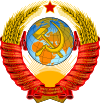戰間期德國與蘇聯關係
| 此條目目前正依照其他維基百科上的內容進行翻譯。 (2022年3月10日) |
戰間期德國與蘇聯關係指自布列斯特和約簽訂至蘇德戰爭爆發期間雙邊關係史。1918年3月3日,由德國主導的《布列斯特-立陶夫斯克條約》簽署,此條約結束了德國與蘇俄(蘇聯前身)的戰爭狀態。[1]幾個月後,德國駐莫斯科大使威廉·馮·米爾巴赫被俄羅斯左翼社會革命黨人槍殺,左翼社會革命黨人試圖藉此重啟俄羅斯與德國之間的戰爭。1918年11月6日,阿道夫·約夫領導的整個蘇聯大使館因為他們積極支持德國革命而被驅逐出德國。卡爾·拉狄克還於1919年在魏瑪德國非法支持共產主義顛覆活動。
 | |
德國 |
蘇聯 |
|---|---|
 | |
德意志國 |
蘇聯 |
|---|---|
從一開始,兩個國家都試圖為推翻第一次世界大戰戰勝國所建立起的新秩序而努力。戰後德國在繁重的賠款下苦苦掙扎,並被《凡爾賽條約》的集體責任條款刺痛,是一個飽受戰後政治動亂困擾的戰敗國。這場戰爭和俄國內戰使德國和蘇聯都成為國際社會的棄兒,這令他們在戰間期的關係迅速升溫。[2][3]同時,他們關係的動態是由缺乏信任和各自政府擔心其夥伴擺脫外交孤立而轉向法國第三共和國(當時被認為擁有歐洲最大的軍事力量)和其盟友波蘭第二共和國形成的。1933年,阿道夫·希特拉上台後,兩國的經濟關係聯繫逐漸減少;然而,兩國的關係在20世紀30年代末再升溫,1939年的《莫洛托夫-里賓特洛甫條約》和雙邊貿易協定使兩國關係達到頂峰。
關於二戰爆發的起因,很少有問題比約瑟夫·斯大林領導下的蘇聯和在納粹黨奪取德國政權至1941年6月22日德國入侵蘇聯期間對納粹德國的外交政策問題更有爭議性和意識形態色彩。[4]關於蘇聯對德國如此的外交政策存在各種相互競爭和相互矛盾的論點,包括蘇聯尋求歐洲資本主義國家發起一場互相殘殺的大戰爭藉此削弱資本主義國家;[5]或是蘇聯奉行純粹的防禦政策;[6]蘇聯試圖避免捲入戰爭等,而這又有蘇聯領導人認為蘇聯當時沒有進行戰略行動的軍事能力的因素。[7]
蘇俄和魏瑪德國[編輯]
革命與一戰的結束[編輯]


第一次世界大戰給魏瑪德國與蘇俄帶來了災難性的後果。一戰後期,布爾什維克為尋求政權生存被迫與德國和談。布爾什維克在面對德國的軍事推進的巨大威脅下,列寧和托洛茨基被迫簽訂了《布列斯特-立陶夫斯克和約》。[8] 和約將俄羅斯西部的大片領土割讓給德意志帝國。1918年11月11日,德國人與協約國簽署停戰協議,結束一戰西線戰事。德國崩潰後,英國、法國和日本軍隊介入俄羅斯內戰。[9]
起初,蘇聯領袖希望德國的社會主義革命勝利,作為其「世界革命」的一部分。然而,德國革命最終被右翼的自由軍團鎮壓。隨後,布爾什維克捲入了1919-20年與波蘭的戰爭之中。由于波蘭是德國的「老敵人」,而且新生的蘇維埃俄國也在國際上被廣泛孤立,因此,蘇維埃政府開始尋求與德國建立更緊密的關係,也因此在外交政策上,對德國採取了更少的敵對性外交政策。在外交事務人民委員格奧爾基·契切林和蘇聯大使尼古拉·克里斯廷斯基的領導下,這一外交路線得到持續的推行。在談判中起作用的其他蘇聯代表有卡爾·拉狄克、列昂尼德·克拉辛、克里斯蒂安·拉科夫斯基、維克多·科普和阿道夫·阿布拉莫維奇·越飛。
參考文獻[編輯]
引用[編輯]
- ^ Full text in English: The Peace Treaty of Brest-Litovsk; March 3, 1918 (頁面存檔備份,存於互聯網檔案館)
- ^ Gasiorowski, Zygmunt J. (1958). The Russian Overture to Germany of December 1924 (頁面存檔備份,存於互聯網檔案館). The Journal of Modern History 30 (2), 99–117.
- ^ Large, J. A. (1978). The Origins of Soviet Collective Security Policy, 1930–32 (頁面存檔備份,存於互聯網檔案館). Soviet Studies 30 (2), 212–236.
- ^ Haslam, Jonathan (1997). "Soviet-German Relations and the Origins of the Second World War: The Jury Is Still Out". The Journal of Modern History 69: 785–797.
- ^ Raack, R. C. Stalin's Drive to the West, 1938–1945: The Origins of the Cold War. Stanford, California, 1995, p. 12.
- ^ Geoffrey Roberts, The Soviet Union and the Origins of the Second World War: Russo-German Relations and the Road to War 1933–1941 (New York, 1995), p. 73.
- ^ Haslam, Jonathan. The Soviet Union and the Struggle for Collective Security in Europe, 1933–39. New York, 1985, pp. 140–41.
- ^ The Peace Treaty of Brest-Litovsk - World War I Document Archive. wwi.lib.byu.edu. [2022-03-10]. (原始內容存檔於2020-02-27).
- ^ Montefiore 2005, p. 32
書籍[編輯]
- Erickson, John, The Soviet High Command: A Military-political History, 1918–1941, Routledge, 2001, ISBN 0-7146-5178-8
- Ericson, Edward E., Feeding the German Eagle: Soviet Economic Aid to Nazi Germany, 1933–1941, Greenwood Publishing Group, 1999, ISBN 0-275-96337-3
- Grenville, John Ashley Soames; Wasserstein, Bernard, The Major International Treaties of the Twentieth Century: A History and Guide with Texts
 , Taylor & Francis, 2001, ISBN 0-415-23798-X
, Taylor & Francis, 2001, ISBN 0-415-23798-X - Hehn, Paul N., A Low Dishonest Decade: The Great Powers, Eastern Europe, and the Economic Origins of World War II, 1930–1941, Continuum International Publishing Group, 2005, ISBN 0-8264-1761-2
- Nekrich, Aleksandr Moiseevich; Ulam, Adam Bruno; Freeze, Gregory L., Pariahs, Partners, Predators: German-Soviet Relations, 1922–1941, Columbia University Press, 1997, ISBN 0-231-10676-9
- Montefiore, Simon Sebac. Stalin: The Court of the Red Tsar 5th. The United Kingdom: Phoenix. 2005 [2003]. ISBN 0-7538-1766-7.
- Philbin III, Tobias R., The Lure of Neptune: German-Soviet Naval Collaboration and Ambitions, 1919 – 1941, University of South Carolina Press, 1994, ISBN 0-87249-992-8
- Roberts, Geoffrey, Stalin's Wars: From World War to Cold War, 1939–1953, Yale University Press, 2006, ISBN 0-300-11204-1
- Shirer, William L., The Rise and Fall of the Third Reich: A History of Nazi Germany, Simon and Schuster, 1990, ISBN 0-671-72868-7
- Wegner, Bernd, From Peace to War: Germany, Soviet Russia, and the World, 1939–1941, Berghahn Books, 1997, ISBN 1-57181-882-0
擴展閱讀[編輯]
- Carr, Edward Hallett. German-Soviet Relations between the Two World Wars. Baltimore: Johns Hopkins Press, 1951.
- Ericson, Edward E. Feeding the German Eagle: Soviet Economic Aid to Nazi Germany, 1933–1941. New York: Praeger, 1999. ISBN 0-275-96337-3
- Everett, Rob. "The Enemy of My Enemy is My Friend: Soviet Foreign Policy in Europe, 1933-1939." Wittenberg History Journal 43 (2014): 53–64. online (頁面存檔備份,存於互聯網檔案館)
- Gorodetsky, Gabriel. "The impact of the Ribbentrop-Molotov pact on the course of Soviet foreign policy." Cahiers du monde russe et soviétique (1990): 27–41. online (頁面存檔備份,存於互聯網檔案館)
- Hill, Alexander. "Soviet Planning for War, 1928–June 1941." in by Thomas W. Zeiler and Daniel M. DuBois, eds. A Companion to World War II (2013): 93–101.
- Himmer, Robert "Rathenau, Russia, and Rapallo." Central European History 9#2 (1976): 146–183.
- Hoppe, Bert, and Mark Keck-Szajbel. "Iron Revolutionaries and Salon Socialists: Bolsheviks and German Communists in the 1920s and 1930s." Kritika: Explorations in Russian and Eurasian History 10.3 (2009): 499–526.
- Jelavich, Barbara. St. Petersburg and Moscow: tsarist and Soviet foreign policy, 1814-1974 (Indiana UP, 1974) pp 311–58.
- Kochan, Lionel. Russia and the Weimar Republic. Cambridge: Bowes & Bowes, 1954.
- Kocho-Williams, Alastair. Russian and Soviet Diplomacy, 1900-39 (Springer, 2011).
- Kshyk, Christopher J. "Did Stalin Plan to Attack Hitler in 1941? The Historiographical Controversy Surrounding the Origins of the Nazi-Soviet War." Inquiries Journal 7.11 (2015). online (頁面存檔備份,存於互聯網檔案館)
- Mueller, Gordon H. "Rapallo Reexamined: a new look at Germany's secret military collaboration with Russia in 1922." Military Affairs 40#3 (1976): 109–117. in JSTOR (頁面存檔備份,存於互聯網檔案館)
- Nekrich, Aleksandr Moiseevich. Pariahs, partners, predators: German-Soviet relations, 1922-1941 (Columbia University Press, 1997).
- Pohl, J. Otto, Eric J. Schmaltz, and Ronald J. Vossler. "'In our hearts we felt the sentence of death': ethnic German recollections of mass violence in the USSR, 1928–48." Journal of Genocide Research 11.2-3 (2009): 323–354. online (頁面存檔備份,存於互聯網檔案館)
- Pons, Silvio. Stalin and the inevitable war, 1936-1941 (Routledge, 2002).
- Rosenbaum, Kurt. Community of Fate: German-Soviet Diplomatic Relations 1922-1928 Syracuse University Press, 1965
- Saul, Norman E. Historical Dictionary of Russian and Soviet Foreign Policy (Rowman & Littlefield, 2014). 700 entries, 326pp
- Shore, Zachary. What Hitler Knew: The Battle for Information in Nazi Foreign Policy (Oxford UP, 2002).
- Ulam, Adam B. Expansion and Coexistence: The History of Soviet Foreign Policy, 1917-1973 (1974) pp 126-313.
- Uldricks, Teddy J. "The Icebreaker Controversy: Did Stalin Plan to Attack Hitler?." Slavic Review 58.3 (1999): 626–643.
- Uldricks, Teddy J. "War, politics and memory: Russian historians reevaluate the origins of world war II." History & Memory 21.2 (2009): 60–82. online (頁面存檔備份,存於互聯網檔案館)
- Weinberg, Gerhard L. Germany and the Soviet Union: 1939-1941 (Brill, 1972).
- Weinberg, Gerhard L. The Foreign Policy of Hitler's Germany: Starting World War II 1937-1939 (1980)
- Weinberg, Gerhard L. Hitler's Foreign Policy 1933-1939: The Road to World War II (2005)
- Wheeler-Bennett, John W. "Twenty Years of Russo-German Relations: 1919-1939" Foreign Affairs 25#1 (1946), pp. 23–43 online (頁面存檔備份,存於互聯網檔案館)
主要來源[編輯]
- Sontag, Raymond James, and James Stuart Beddie, eds. Nazi-Soviet relations, 1939-1941: Documents from the archives of the German foreign office (US Department of State, 1948) online (頁面存檔備份,存於互聯網檔案館).
外部連結[編輯]
- Nazi-Soviet Relations 1939–1941 (頁面存檔備份,存於互聯網檔案館) @ Avalon Project
- Nazi-Soviet Relations 1939–1941 (頁面存檔備份,存於互聯網檔案館) @ All World Wars
- (俄語)Пронин А.А., Советско-германские соглашения 1939 г. Истоки и последствия//Международный исторический журнал, №№ 10–12, 2000 (頁面存檔備份,存於互聯網檔案館)
| ||||||||||||||||||||||||||||||||
| |||||||||||||||||||||||||

